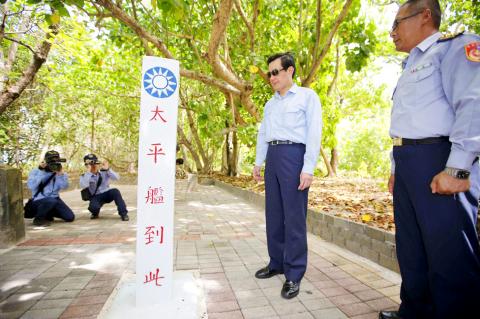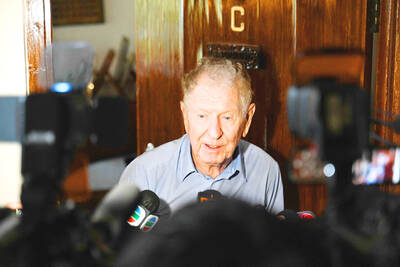President Ma Ying-jeou (馬英九), ignoring US criticism, yesterday visited Itu Aba Island (Taiping Island, 太平島) in the South China Sea, where he reiterated the Republic of China’s (ROC) sovereignty over the land mass and its status as an island.
Accompanied by government officials and academics, Ma boarded the presidential plane at the Songshan Air Force Base in Taipei, flying to Pingtung County early yesterday morning, before transferring to a C-130 transport aircraft bound for Itu Aba.
Ma arrived at about 11am on Itu Aba, the largest island in the Spratly Islands (Nansha Islands, 南沙群島), which has been administered by Taiwan since 1956 and is also claimed by China, the Philippines and Vietnam.

Photo: CNA
Ma is the second ROC president to set foot on the island, after then-president Chen Shui-bian (陳水扁), who visited it on Feb. 2, 2008.
After meeting with staff stationed on the island, Ma delivered a speech in front of a memorial tablet bearing a message from him that read: “Peace in the South China Sea and our national territory secure forever.”
“I am very happy to be here today, before the Lunar New Year, on Taiping Island, with all of you stationed on the Nansha Islands, which are part of the southern territories of the ROC,” Ma said.
Ma said the disputed islands in the South China Sea were first discovered, named and used by the Chinese in the 1st century BC, and the ROC government later published maps of the islands in 1935 and 1947.
The Spratly Islands, the Paracel Islands (Xisha Islands, 西沙群島), the Macclesfield Bank (Zhongsha Islands, 中沙群島), and Pratas Islands (Dongsha Islands, 東沙群島) are all an inherent part of the ROC’s territory and waters, whether from the perspective of history, geography, or international law, Ma said.
“To resolve disputes in the South China Sea... on May 26, 2015, I put forth the South China Sea Peace Initiative, calling on all parties concerned to reduce tensions, increase dialogue, abide by international law, uphold freedom of navigation and overflight, maintain peace and stability in the South China Sea, and settle disputes peacefully,” Ma said.
In an effort to flesh out the initiative, Ma yesterday proposed a “South China Sea Peace Initiative Roadmap,” based on “three yeses and three noes”: yes to cooperation, no to confrontation; yes to sharing, no to monopolization; and yes to pragmatism, no to intransigence.
Ma said the roadmap offers a viable path, two essential elaborations and three phases of progress.
“The viable path consists of shelving disputes, integrated planning and zonal development,” he said.
The two essential elaborations call for concerned parties to be included in the initiative’s consultation mechanism, and to engage in cooperation and negotiations, Ma said, adding that the mechanism should not impede the formation of a final agreement on the territorial disputes.
The three phases of progress refer to short, medium and long-term planning, with the government working to transform Taiping into an island for peace and rescue operations, as well as an ecologically friendly and low-carbon island, the president said.
Ma rejected the Philippines’ categorization of Itu Aba as a “rock,” saying the island has sufficient natural vegetation thanks to its favorable soil and water quality.
“Such statements [by the Philippines] have no basis in either science or fact; they are totally wrong. The economic, environmental and cultural realms all provide sufficient evidence to show that the island has — and has had for more than 100 years — ample resources to be self-sufficient,” Ma said.
The island is home to 106 indigenous plant species, several animal species, a variety of sources of food, and a 10-bed hospital manned by two physicians, a dentist and three nurses, he said.
“All this evidence fully demonstrates that Taiping Island can sustain human habitation and an economic life of its own. It is not a rock, but an island, and meets the criteria for an island as specified in Article 121 of the UN Convention on the Law of the Sea,” he added.
Ma arrived back in Taipei at about 5:40pm.

MORE VISITORS: The Tourism Administration said that it is seeing positive prospects in its efforts to expand the tourism market in North America and Europe Taiwan has been ranked as the cheapest place in the world to travel to this year, based on a list recommended by NerdWallet. The San Francisco-based personal finance company said that Taiwan topped the list of 16 nations it chose for budget travelers because US tourists do not need visas and travelers can easily have a good meal for less than US$10. A bus ride in Taipei costs just under US$0.50, while subway rides start at US$0.60, the firm said, adding that public transportation in Taiwan is easy to navigate. The firm also called Taiwan a “food lover’s paradise,” citing inexpensive breakfast stalls

US PUBLICATION: The results indicated a change in attitude after a 2023 survey showed 55 percent supported full-scale war to achieve unification, the report said More than half of Chinese were against the use of force to unify with Taiwan under any circumstances, a survey conducted by the Atlanta, Georgia-based Carter Center and Emory University found. The survey results, which were released on Wednesday in a report titled “Sovereignty, Security, & US-China Relations: Chinese Public Opinion,” showed that 55.1 percent of respondents agreed or somewhat agreed that “the Taiwan problem should not be resolved using force under any circumstances,” while 24.5 percent “strongly” or “somewhat” disagreed with the statement. The results indicated a change in attitude after a survey published in “Assessing Public Support for (Non)Peaceful Unification

The CIA has a message for Chinese government officials worried about their place in Chinese President Xi Jinping’s (習近平) government: Come work with us. The agency released two Mandarin-language videos on social media on Thursday inviting disgruntled officials to contact the CIA. The recruitment videos posted on YouTube and X racked up more than 5 million views combined in their first day. The outreach comes as CIA Director John Ratcliffe has vowed to boost the agency’s use of intelligence from human sources and its focus on China, which has recently targeted US officials with its own espionage operations. The videos are “aimed at

Four former Hong Kong opposition lawmakers jailed in the territory’s largest national security case were released yesterday after more than four years in prison, the first among dozens convicted last year to regain their freedom. Former legislators Claudia Mo (毛孟靜), Jeremy Tam (譚文豪), Kwok Ka-ki (郭家麒) and Gary Fan (范國威) were part of a group of 47 public figures — including some of Hong Kong’s best-known democracy advocates — who were charged with subversion in 2021 for holding an informal primary election. The case fell under a National Security Law imposed on the territory by Beijng, and drew international condemnation and warnings